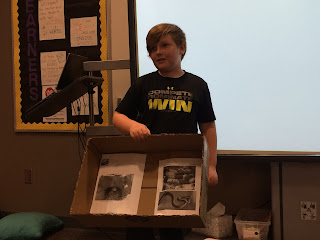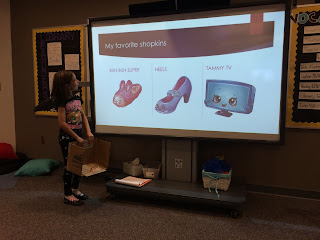It’s Friday everyone!
It’s the start of a long day and I am excited to be presenting at the
New Mexico Library Association’s Mini-Conference on my Genius Hour Club. To those of you that are visiting my blog
after the presentation, welcome!
Hopefully this post (and others) will be helpful to you. If you are a new librarian I just posted six
tips from my first year. Go ahead and
check it out to see if any of them will help make your next year easier.
Reflecting on this ten week club I have learned a lot. Some things worked and others will need to be
changed next year. But I definitely hope
to do a Genius Hour Club next year! It
was a fun experience and think it was valuable for my students that participated. One parent thanked me at the final day of
club saying it had helped her daughter who struggles with research. She even said the presentation part was
valuable to help with anxiety! I never
had thought of that before but I was glad to see the program had unexpected
positive effects.
If you click the picture below you will be linked to my
Prezi presentation that I presented at the conference. There you can find the lessons that I learned
and links from the presentation.
I also wanted to show you some examples of student work from
the club, but I will post those separately. Below are my lessons from Genius Hour. Hope they can help you start your own club or time in your classroom!
Lesson 1: Advertisement is Key!
When I did my Battle of the Books club, I had many students that didn't know what it was and missed signing up because of that. This semester I asked the club coordinator to put in a description of the event for Genius Hour, but for various reasons this did not happen. It is important to get the word out! Put up posters, present the information during your library classes, and invite students that you know might be interested.
Lesson 2: Model What You Teach
I used this time as not only time for my students but myself as well. Students learn so much from watching the process! I chose my own Genius Hour topic and looked into the process of writing a children's book. Since this is something I've been interested in doing for fun, I figured this would give me the perfect opportunity to carve out time. Use your own project to model the process for students.
Lesson 3: Brackets aren't just for March Madness!
I quickly realized it would be hard for my students to narrow down their topics and choose just one. To make the process easier I used a bracket. Students wrote down potential topics and then narrowed them down by deciding which they like better between two options. This was a HUGE help and I highly recommend it when narrowing down topic ideas.
Lesson 4: Prior Knowledge is Key
Throughout the year I have done a lot of research lessons with my fourth and fifth graders. I have also done some with third grade, but we have not gone as deep with them yet. I noticed my third graders struggled more with the research portion. The more research you have taught in your regular library classes the easier the process will be for your students since your time is short.
Lesson 5: Get Others Involved
When I originally started the club, I wanted students to be able to contact professionals in the field they were studying to interview them. As time went on, we got busy and this didn't happen and it is one big regret I have. If you want to bring in community members and professionals, start early! Also, inviting family and teachers to enjoy the celebration and presentations at the end was a lot of fun. Try to have a "show and tell" time for the students to show off all their hard work.
Lesson 6: Check In Each Week
This really helps the kids stay on track and helps you facilitate the process. I called students back one at a time and talked about how they were feeling about their project, what they needed to do that day (goal setting!), and what they needed from me. You could also do quick check ins at the beginning of each time and just have the kids tell you their goal for that day.
Lesson 7: Let It Go!
Things never go as planned. Kids drop out. Some kids will be more excited than others. There will be a student that just can't seem to stay on task. Just go with it and remember your mission for this club. We want kids to become lifelong learners! The process is messy and you will make it through.
Lesson 8: Know Your Resources
One thing I wish I had done was give students more of an introduction to their presentation options. Research different ways students can present the material, then quickly highlight two each week. This will help those that want to branch out of the Powerpoint rut know other options.
Do you plan on hosting a Genius Hour club in your library? What about having Genius Hour in your classroom? I would love to hear your ideas and tips! Until next time, happy reading!




















